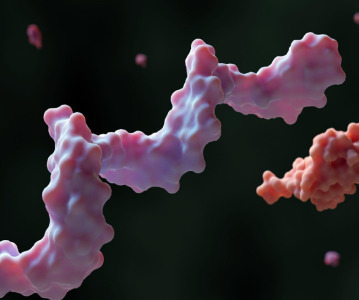Discovery of molecular pathway of Alzheimer's disease reveals new drug targets
The discovery of the molecular pathway that drives the changes seen in the brains of Alzheimer's patients is reported today, revealing new targets for drug discovery that could be exploited to combat the disease.
The discovery of the molecular pathway that drives the changes seen in the brains of Alzheimer's patients is reported today, revealing new targets for drug discovery that could be exploited to combat the disease. The study gives the most detailed understanding yet of the complex processes leading to Alzheimer's.
Alzheimer's disease is associated with plaques made up of deposits of a molecule called amyloid between brain cells, which leads to the formation of tangles of twisted fibres made from a molecule called tau, found inside the brain cells. This causes the death of brain cells which is thought to bring about the symptoms of memory loss and dementia. Although it has been accepted for over twenty years that the progression of disease is driven by amyloid and results in abnormal changes in tau, the exact mechanisms of disease remain somewhat of a mystery.
Recent genome wide association studies have identified the gene for a molecule called clusterin as a susceptibility factor for late-onset Alzheimer's disease. Levels of clusterin are also known to be elevated in blood in patients with Alzheimer's from an early stage in the disease so the researchers wanted to find out what role it might play in the progression of disease.
The team, led by researchers at King's College London's Institute of Psychiatry, looked first in mouse brain cells grown in the laboratory and found that the presence of amyloid alters the amount of clusterin in these cells. Clusterin then acts to switch on a signalling pathway that drives the changes in tau that are associated with the formation of tangles inside the cells, another hallmark of the disease. When this signalling pathway was chronically switched on in a mouse model of the disease, the researchers observed an increase in tangle formation and evidence of cognitive defects.
The study, published today in the journal Molecular Psychiatry, also looked in humans and detected the signature of clusterin activation in the brains of Alzheimer's patients but not in the brains of patients with other forms of dementia.
Dr Richard Killick from King's College London's Institute of Psychiatry said: "This is the first time we've been able to connect the molecular mechanisms behind the formation of amyloid plaques in the brain with the formation of tangles inside the brain cells, two of the defining features of Alzheimer's disease. Our research has given the most detailed picture yet of how the disease progresses and we hope it will offer leads for the development of new treatments."
The signalling pathway that is turned on by clusterin is called DKK1-WNT. It involves interactions between a number of different molecules that could prove to be useful targets for the development of new drugs.
Current treatments for Alzheimer's are focused on alleviating the symptoms and there is no therapy that can prevent the progression of disease.
Professor Simon Lovestone, also from King's College London's Institute of Psychiatry, who led the study, said: "We have shown that we can block the toxic effects of amyloid when we stop this signalling pathway in brain cells grown in the lab. We believe that if we could block its activity in the brains of Alzheimer's patients too, we may have an opportunity to halt the disease in man. Indeed, we have already begun our own drug development programme to do just that and are at the stage where potential compounds are coming back to us for further testing."
The DKK1-WNT pathways has also been implicated in some human cancers and although there is no evidence for a direct link, the findings from this study mean that there could be an opportunity to make advances in Alzheimer's research by capitalising on knowledge that is being gained from cancer research, the authors suggest.
Dr John Williams, Head of Neuroscience and Mental Health at the Wellcome Trust, which helped fund this study, said: "We will see more and more people affected by Alzheimer's disease as our population ages. This study gives us a much-needed additional insight to the complex biology that contributes to the development of Alzheimer's, which is vital if we are to develop new treatments that are so urgently needed."
The study was largely funded by the Wellcome Trust, the Alzheimer's Society, BUPA foundation and Alzheimer's Research UK.
Related News
-
News Google-backed start-up raises US$600 million to support AI drug discovery and design
London-based Isomorphic Labs, an AI-driven drug design and development start-up backed by Google’s AI research lab DeepMind, has raised US$600 million in its first external funding round by Thrive Capital. The funding will provide further power t... -
News AstraZeneca to invest US$2.5 billion in Beijing R&D centre
Amid investigations of former AstraZeneca China head Leon Wang in 2024, AstraZeneca have outlined plans to establish its sixth global strategic R&D centre in China. Their aim is to further advance life sciences in China with major research and manufact... -
News Experimental drug for managing aortic valve stenosis shows promise
The new small molecule drug ataciguat is garnering attention for its potential to manage aortic valve stenosis, which may prevent the need for surgery and significantly improve patient experience. -
News How GLP-1 agonists are reshaping drug delivery innovations
GLP-1 agonist drug products like Ozempic, Wegovy, and Mounjaro have taken the healthcare industry by storm in recent years. Originally conceived as treatment for Type 2 diabetes, the weight-loss effects of these products have taken on unprecedented int... -
News A Day in the Life of a Start-Up Founder and CEO
At CPHI we work to support Start-Up companies in the pharmaceutical industry and recognise the expertise and innovative angles they bring to the field. Through our Start-Up Programme we have gotten to know some of these leaders, and in this Day in the ... -
News Biopharmaceutical manufacturing boost part of new UK government budget
In their national budget announced by the UK Labour Party, biopharmaceutical production and manufacturing are set to receive a significant boost in capital grants through the Life Sciences Innovative Manufacturing Fund (LSIMF). -
News CPHI Podcast Series: The power of proteins in antibody drug development
In the latest episode of the CPHI Podcast Series, Lucy Chard is joined by Thomas Cornell from Abzena to discuss protein engineering for drug design and development. -
News Amgen sues Samsung biologics unit over biosimilar for bone disease
Samsung Bioepis, the biologics unit of Samsung, has been issued a lawsuit brought forth by Amgen over proposed biosimilars of Amgen’s bone drugs Prolia and Xgeva.
Recently Visited
Position your company at the heart of the global Pharma industry with a CPHI Online membership
-
Your products and solutions visible to thousands of visitors within the largest Pharma marketplace
-
Generate high-quality, engaged leads for your business, all year round
-
Promote your business as the industry’s thought-leader by hosting your reports, brochures and videos within your profile
-
Your company’s profile boosted at all participating CPHI events
-
An easy-to-use platform with a detailed dashboard showing your leads and performance







.png)